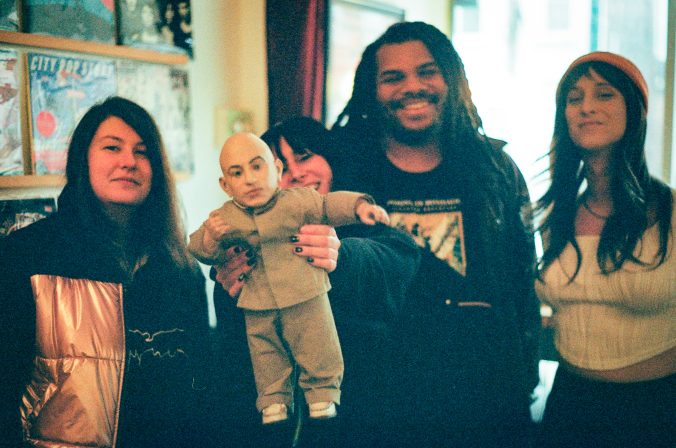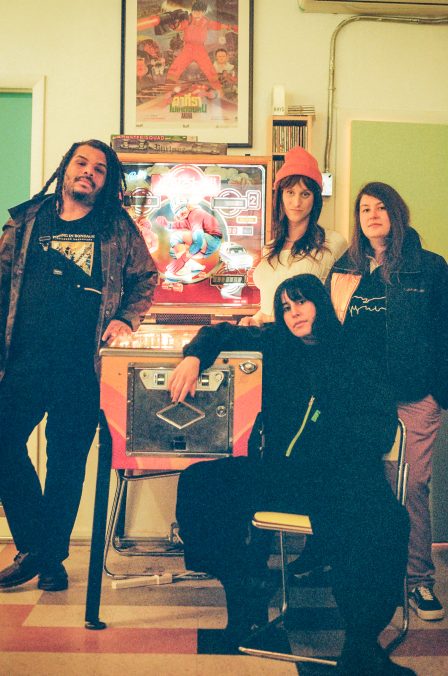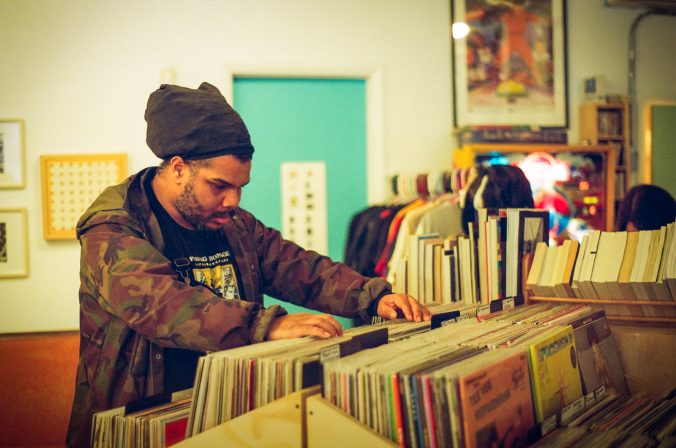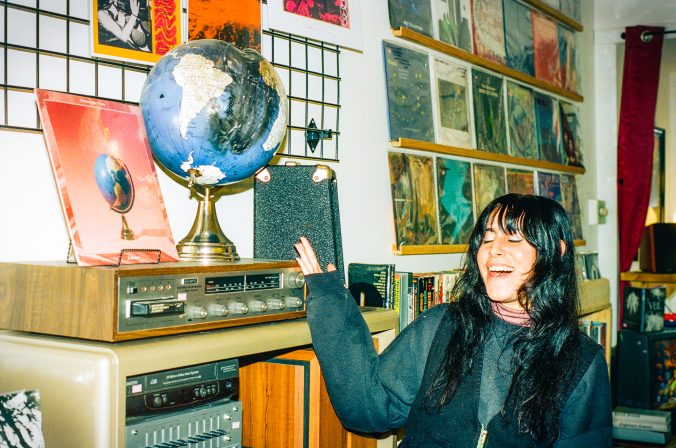Mannequin Pussy’s Divine Intervention
The Philly punk quartet talks working with John Congleton, confronting religious oppression and I Got Heaven over lunch and record shopping.
Photos by Juliette Boulay
When people think about the Philadelphia music scene, one of the first places that comes to mind is Johnny Brenda’s. I love it here, but I’m not familiar with navigating it in the daytime—when the bar and grill is open to the public for midday lunches in sunny Fishtown. So, when I stroll into JB’s on a Thursday afternoon, I feel a tad awkward, unsure of where to sit or how long I can get away with nursing a glass of ice water before making a lunch entrée selection. On the other hand, when the members of Mannequin Pussy—Marisa Dabice, Maxine Steen, Bear Regisford and Kaleen Reading—walk in, they’re immediately greeted as longtime friends in the sparse restaurant. That’s because they are longtime friends of the storied venue, having packed its stages numerous times over and coming regularly and independently for the bar’s and other delicacies. This is my first time seeing the band in their home environment after seeing them rock two stages in Cleveland. We settle in at a booth towards the restaurant’s midsection and talk about their new album, I Got Heaven.
When Marisa and Thanasi Paul first started Mannequin Pussy in 2010, they cut their teeth in Philadelphia’s underground punk scene, generating a consistent buzz that kept their name at the top of everybody’s mind. “Our fans are people who are not immediately turned off by the word ‘pussy,’” Marisa elaborates. At one time, that fanbase might have been a narrow, young generation clad in black and prone to moshing, but in 2024, that demographic has grown tremendously. “For a while, before Gen Z started coming to an age where they could go to shows and explore their own interests, our fans were mostly our own age. Now we have a fanbase that often runs young and queer,” Marisa continues. “Now, dads are starting to bring their young daughters to shows and bonding.”

While Mannequin Pussy has an enthusiastic international audience, the band is particularly grateful for the support they’ve gathered at home in Eastern Pennsylvania: “Bear said something that stood out to me which is that, often, your hometown falls in love with you last. I think Philly very much loved us first,” Marisa adds. Bear attributes Philadelphia’s rapport with fans of cult stardom to the scene’s immediate embrace of their unusual brand of punk. Philly is a big city, one that has produced titans of jazz, soul, emo, shoegaze and more, so audiences are primed to welcome bands who dart between different sounds—so long as they’re done well.
In Philadelphia, there are simply so many musicians who want to perform with their friends, which leads to mixed-genre bills where the links between the sounds are few, but there’s a shared reverence that the musicians and the audiences share that makes it all make sense. I think about this when I remember seeing Mannequin Pussy open for Japanese Breakfast—a peer whose sound couldn’t be more different—at The Agora in Cleveland. The two projects rose in the latter half of the 2010s after years toiling in the Philly underground, so when the two bands play for each other, their mutual appreciation shines. That’s what cues people into the idea that Philly is a good city for starting a band.
While Mannequin Pussy’s fiery punk is still foundational to the band’s recordings and performances, they’re just as likely to drift into other stylings. One of the band’s most enduring hits, “Drunk II,” inhabits an emo-indie rock interstitial space that has won over fans of both classic indie and heavy music. Now, on I Got Heaven, Mannequin Pussy careens between fast-paced hardcore and contemplative post-punk without sacrificing vitality to fit into any kind of genre mold. The lane that Mannequin Pussy occupies in I Got Heaven is not unlike the the sounds they tested on 2019’s Patience or their 2021 EP Perfect, but there’s a stylistic growth that’s especially potent on “I Don’t Know You:” it is the first Mannequin Pussy song that one could call elegant. It’s hard to believe this is the same Mannequin Pussy that released a self-titled album—a brief and entirely punk foray—10 years ago, given the variety of styles they play and play well.

I Got Heaven marks the first time that Mannequin Pussy decamped from their southeast Pennsylvania base of operations to Los Angeles make music with the help of storied producer John Congleton, the producer behind some of indie’s biggest heaters from Sleater-Kinney, Bully and Explosions in the Sky. For a band that never took themselves too seriously as people but treated their craft with the utmost sincerity, it turned out to be a match made in heaven. “Brett [the owner of Epitaph Records] saw the potential for that partnership. He was forthcoming that he thought we should leave Philadelphia and make a destination record,” Marisa explains. Congleton had a similar approach to the process as the members of Mannequin Pussy: Everyone in that room treats the songwriting craft and development process with inspiring rigor, going so far as to assign each other homework after sessions. But their senses of humor aligned so well that the process felt perfectly natural.
While I Got Heaven has echoes of those humorous moments throughout, the album’s title calls attention to religion, and experiences navigating American Christian hypocrisy are laced throughout. The frenetic punk title track opens in a state of spiritual crisis with Marisa yelling absurd questions: “And what if we stopped spinning / And what if we’re just flat? / And what if Jesus himself ate my fucking snatch?” Before long, she reaches her dispiriting conclusion: “It is vileness wrapped up and disguised as happy endings.” “My experience with religion is quite atypical,” Marisa says. In Connecticut, she grew up in a family that left Roman Catholicism—a more mainstream Christian sect—for a congregationalist community that was open and affirming. Marisa was used to the idea that worship communities were progressive until she left for college and met classmates who grew up in more traditional faiths—women who’d experienced all kinds of shame associated with expected chastity, people who’d been subjected to conversion therapy in a Christian context. She had to unlearn her own faith to understand just how religious texts and edicts can be interpreted differently, even used as a weapon against people on the margins.
“It’s definitely control through fear,” Bear adds, recounting how his mother put him in Catholic school at a young age, he jokes, because she thought it would teach him humility. He was an altar boy for years, but he identifies his experience watching Malcolm X in middle school with a sudden curiosity about religions beyond his knowledge. The mere concept of other religious traditions, or how they intersect with race and politics, did not cross his mind until that moment. When he asked his teachers or his mother about other traditions, like Islam in the United States and abroad, he got nowhere. “I didn’t end up finishing my confirmation,” he explains. “They taught me just one line to get to holiness and be a normal citizen. As you meet other people in the world, you realize there are so many other ways to live and be happy.”

-

-

-

-

-

-

-

-

-

-

-

-

-

-

-

-

-

-

-

-

-

-

-

-

-

-

-

-

-

-

-

-

-

-

-

-

-

-

-

-











































